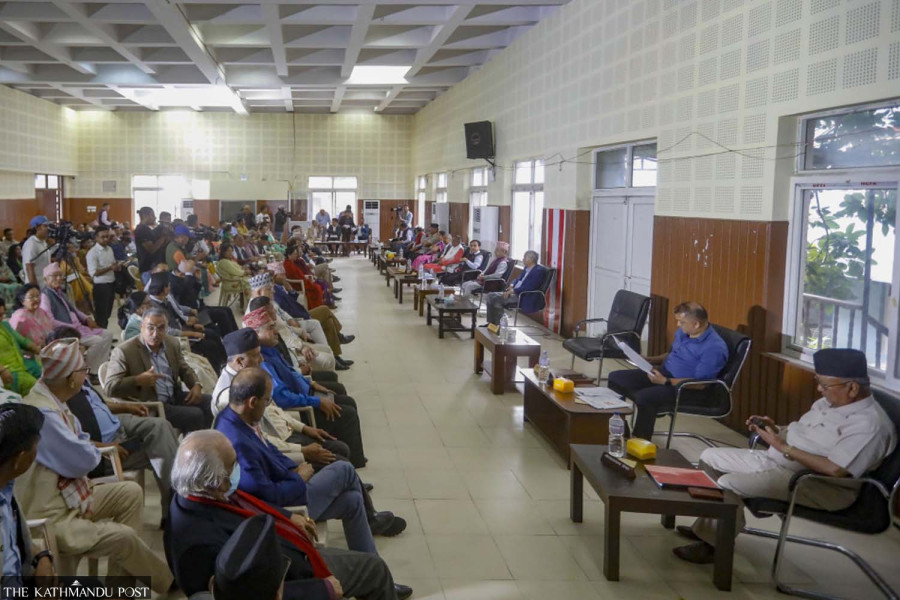Politics
Nepali Congress leaders say the party has failed its rank and file
The third day of the party’s central working committee meeting saw leaders present their views on a host of topics, including the growing ‘authoritarian’ tendency in the leadership.
Tika R Pradhan
On Thursday, the third day of the Nepali Congress’s Central Working Committee meeting, leaders came down heavily on the leadership, accusing it of failing the party on various fronts.
Leaders speaking at the meeting said that the party’s top brass has failed to instil in the Congress rank and file a sense that the party was in government. They accused that despite being the largest party in the government, it has been playing second fiddle to the CPN (Maoist Centre), a distant third force in Parliament.
The targets of the leaders’ ire were the party president Sher Bahadur Deuba and general secretary duo Gagan Thapa and Bishwa Prakash Sharma. The leaders, however, stopped short of naming names.
Nepali Congress, the largest party in the federal parliament with 88 seats, supported the Maoist-led coalition government earlier this year. The Congress holds nine ministries, the highest for any party, in the current government. That major role, however, hasn’t inspired party members, argued leaders including Karna Bahadur Budha and Mahendra Kumar Raya.
Some central members also questioned the party’s decision to fight the elections under an alliance. They cited the party’s poor performance in Chitwan, alleging the party leadership that it forged the alliance there just to save the coalition.
“In Chitwan, all the crucial offices—those of the mayor, the chief district officer, Superintendent of Police, the land commission and the Cancer Hospital—are under the control of the Maoists,” said Tek Bahadur Gurung, a central working committee member. “YCL [Young Communist League] holds sway there while our concerns are ignored.”
Most of the leaders speaking on Thursday alleged an “authoritarian” tendency in the party leadership. They demanded the party should have a clear stance on issues of national concern such as federalism, secularism, and development model. The party should discuss ways to address the problems the people are currently facing, they added.
“The party should conduct political training on issues like federalism and secularism and development model,” said Yagya Raj Joshi, a central member.
Joshi also said the largest party of the country should come up with an economic policy of its own and devise ways to bring back youths forced to seek greener pastures abroad.
“Shouldn’t we discuss Congress’s economic policy at a time when the country’s economic situation is grim?” Joshi said. “Shouldn’t this meeting speak of our youths suffering abroad? Let’s prepare a vision paper and implement it.”
A number of central leaders expressed serious concern over the growing public disenchantment with the party.
While the party basks in the glory of an election win, it has failed to address widespread frustrations among people and inspire confidence in the party’s rank and file. “The party hasn’t run by the rules,” said Sanjay Kumar Gautam, who is also a lawmaker. “All the party committees are in disarray. There is no parliamentary board and no one knows who appoints ministers and distributes tickets [for elections].”
He added that the central committee should speak against the monopoly of a handful of leaders. “Should we follow the orders [of a few leaders] or should there be a rule to guide a decision?” Gautam said. “We are forced to play meek spectators to the monopoly of the district committees. We are not in a situation to show our faces in the villages. Many active members have not renewed their membership.”
Meanwhile, speaking at Thursday’s meeting, Ajay Babu Shiwakoti said he was bullied by a responsible party leader on the sidelines of the meeting. “It is an undemocratic practice to bully a member of the party for merely expressing an opinion via mass media,” Shiwakoti said, revealing that he was threatened by Arzu Rana, a central member who is also the spouse of party chief Deuba, after the meeting on Tuesday.
The issue of social justice was also on the table at Thursday's meeting. Many Janajati leaders including Ram Janam Chaudhary, Gopal Dahit, Yogendra Chaudhary and Taraman Gurung expressed serious concern over the attitude of the party leadership towards the policy of inclusion. The leaders said the party would suffer more if the leadership continued to ignore the concerns of leaders and cadres representing Madhes, and Dalit and Muslim communities and various ethnic groups.
The Congress leadership has come under fire for ignoring calls to suspend central member Balkrishna Khand, who is in police custody in connection with the fake Bhutanese refugee scam. Without specifying the incident, Prakash Rasaili said that his party continues to ignore corruption issues.
Rasaili said the party should launch a week-long anti-corruption campaign. “I don’t have biases against anyone but the Congress keeps its mouths, eyes and ears shut when it faces anything about corruption,” he said. “It’s not about an individual. There may or may not be any involvement of our party leaders.”
Meanwhile, Chief Minister of Gandaki Province Surendra Raj Pandey challenged General Secretary Thapa to practise what he preaches.
“There is a process of electing and removing the party president and parliamentary party leader,” he said. “If we have to do it, we should do it as per the rule. Leaders should not propagate rumours against the party.”
Thursday’s meeting saw as many as 35 leaders, including two chief ministers—Koshi’s Uddhav Thapa and Gandaki’s Pandey—present their views. The preceding day, as many as 50 leaders had aired their views.
The meeting will continue on Friday.




 9.7°C Kathmandu
9.7°C Kathmandu














